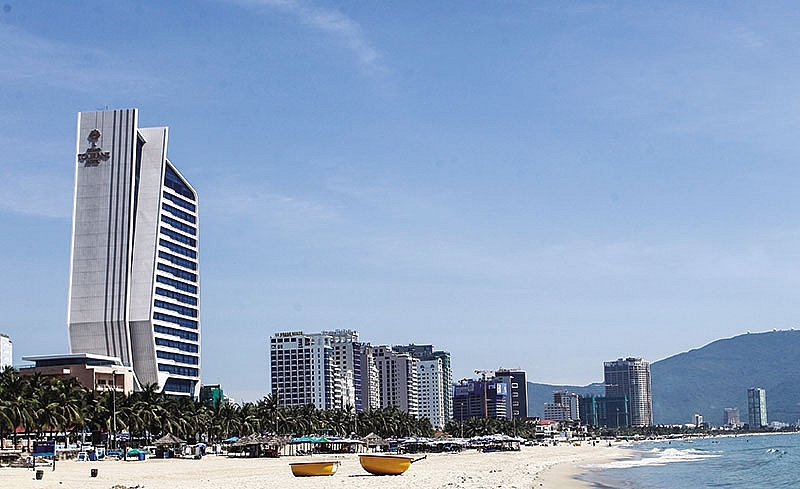Condotels concerning to experts
 |
| Despite being a popular asset type, cash flow problems for initial condotel investment years are raising worries, Photo: Le Toan |
Condotels are a blend of hotel and condominium accommodation, with the service standards of a hotel but the independence of a condominium.
According to Can Van Luc, an expert from Bank for Investment and Development of Vietnam, despite the high financial capacity of their owners, some condotel projects may not be free of risk.
“The current committed yield of up to 15 per cent is too high. Buyers may think that this high yield could be from the good management, but I think that this yield indicates substantial risk,” Luc said.
This comes from two factors: firstly, the above yield is much higher than that offered by banks, and secondly, the higher the committed yield, the more risk it can bear. Luc also said that in Thailand or China, the yield is currently standing at only 5 to 7 per cent.
Apart from high yield, Luc also said that condotel developers offer too long a guaranteed return period, from 8 to 12 years, while a reasonable time should be around five years, after which the yield would be shared between developers and buyers.
“This is the international concept and we should also follow it,” Luc said.
Stephen Wyatt, country director of JLL Vietnam, said that, like hotels and resorts, the development of condotels will require developers to have proven experience in managing such types of developments to maintain good operating performance.
“Typically, in the first two or three years of operation, a hospitality project will make no profit or possibly suffer losses. If a performance guarantee has been made, the difference between the operational loss and the promised yield will need to be covered by the developer,” said Wyatt.
Mauro Gasparotti, director of Savills Hotels Asia Pacific, said that the high yield commitment from developers makes buyers believe in the project and allows them to calculate their investment.
“However, the stable yield of a condotel project is not constant over time and it depends on many different factors. Among those are the demand of the local area where the project is located and the operation of the project, which could be up and down,” Gasparotti said.
Apart from that, since condotels operate like hotels, there are still other outside factors which developers cannot foresee, such as the investment environment, policy, and even new flights.
“Therefore, even a condotel project which belongs to prestigious developers could be susceptible to risk, and there are many things that could interfere with the commitment from the developers to their buyers,” he said.
Gasparotti suggested that developers should seek out alternative profit sources to meet the shortage of profit in the first years when the project is newly operational and has not yet gained full occupancy. “For some projects, we have advised to diversify profit sources such as food and beverage, golf, or turning unsold units into serviced apartments in order to have additional profit to pay yield to buyers,” he said.
Trinh Van Quyet, chairman of FLC Group, argued that risks are low for condotel projects which have been undertaken by professional developers. “For FLC’s condotel projects, we have met all of our commitments to buyers, and our projects have been fully occupied in peak season. For the lower season we still have occupancy from 40 to 60 per cent, and this figure can assure the yield to our customers,” Quyet said.
Condotels have become an increasingly popular asset type, with a significant increase in both supply and demand across Vietnam. More than 22,800 condotel were launched for sale in 2017, and similar figures are likely to be reached in 2018 and 2019. In line with overall improvements in the property market, many condotel projects have reportedly achieved positive sales rates of up to 70-80 per cent within just six months of launching.
The condotel sub-market is dominated by a number of big local developers, such as Vingroup, Sun Group, and FLC, and most projects are concentrated in key coastal locations, including Danang, Nha Trang, and Phu Quoc Island.
Since late 2016 and early 2017, some new developers have entered the market, including Empire Group, Novaland, and The Grand Ho Tram, increasing their footprint with a number of condotel projects launched in Danang, Cam Ranh, and Vung Tau.
Some developers have recently started to use the condotel model in their commercial projects in Ho Chi Minh City and Hanoi. This is a creative approach to adopting the condotel model in order to generate cash flows at an earlier stage of investment.
What the stars mean:
★ Poor ★ ★ Promising ★★★ Good ★★★★ Very good ★★★★★ Exceptional
Related Contents
Latest News
More News
- NAB Innovation Centre underscores Vietnam’s appeal for tech investment (January 30, 2026 | 11:16)
- Vietnam moves towards market-based fuel management with E10 rollout (January 30, 2026 | 11:10)
- Vietnam startup funding enters a period of capital reset (January 30, 2026 | 11:06)
- Vietnam strengthens public debt management with World Bank and IMF (January 30, 2026 | 11:00)
- PM inspects APEC 2027 project progress in An Giang province (January 29, 2026 | 09:00)
- Vietnam among the world’s top 15 trading nations (January 28, 2026 | 17:12)
- Vietnam accelerates preparations for arbitration centre linked to new financial hub (January 28, 2026 | 17:09)
- Vietnam's IPO market on recovery trajectory (January 28, 2026 | 17:04)
- Digital economy takes centre stage in Vietnam’s new growth model (January 28, 2026 | 11:43)
- EU Council president to visit Vietnam amid partnership upgrade (January 28, 2026 | 11:00)

 Tag:
Tag:




















 Mobile Version
Mobile Version